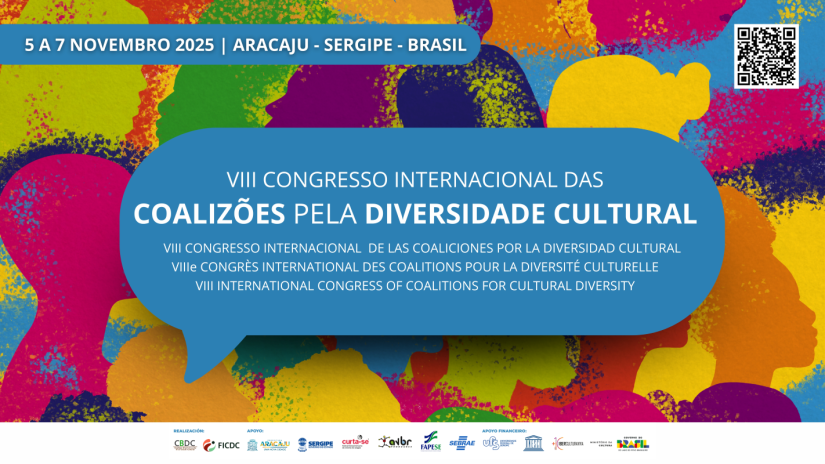
Aracaju, Brazil, November 7, 2025
The Coalitions for Cultural Diversity, members of the IFCCD and representing organizations from the cultural and arts sector, met in Aracaju, Brazil, and online from November 5 to 7, 2025, on the occasion of the VIII International Congress of Cultural Diversity Coalitions.
Twenty years after the adoption of UNESCO’s 2005 Convention on the Protection and Promotion of the Diversity of Cultural Expressions, the Congress emphasized the importance of renewing commitments to cultural diversity, with particular attention to ensuring that technology continues to serve human creativity and intercultural dialogue. Emerging technologies, particularly generative artificial intelligence, are profoundly redefining cultural ecosystems, disrupting value chains, reinforcing homogenizing dynamics, and undermining the socio-economic conditions of artists and their professional communities, thus compromising the vitality and plurality of cultural and linguistic content in the digital age.
The Congress also recalled the fundamental role of civil society in the implementation of the Convention, both in monitoring national cultural policies and measures and in promoting culture as a sustainable development goal. Through their engagement, the cultural diversity coalitions ensure that the Convention continues to inspire concrete and inclusive actions serving creators, cultural professionals, and citizens.
Taking note of the discussions held during this Congress, the Coalitions for Cultural Diversity:
- Reaffirm the importance of coherence between trade agreements and international commitments on cultural diversity to guarantee states’ rights to support ambitious cultural policies;
- Highlight the issues related to the diversity of cultural expressions online in light of the impact of artificial intelligence, particularly generative AI;
- Support digital regulation that respects cultural rights, ensuring the discoverability of local works, linguistic diversity, and algorithmic transparency, especially in the context of artificial intelligence, and based on cultural sovereignty and data ethics, so that knowledge, languages, and artistic expressions cannot be exploited without consent ;
- Call for the development of an additional protocol to the 2005 Convention dedicated to digital challenges, in order to better regulate the practices of platforms and AI systems;
- Recall the continuing value and relevance of the 2005 Convention, as well as the essential role of civil society, particularly youth, in its implementation;
- Encourage the adoption of cultural policies that strengthen the status of artists by promoting fair remuneration, freedom of creation, diversity of creators and their cultural expressions, and effective implementation of the 1980 Recommendation concerning the Status of the Artist;
- Recognize that the digital divide remains a major obstacle to the full implementation of the objectives of the 2005 Convention and encourage policies that support artists’ mobility, circulation of works, and equitable access to international markets and digital spaces;
- Call for increased efforts in favor of preferential treatment for developing countries, while welcoming the Fair Culture initiative;
- Encourage global solidarity and South–South cooperation through intercontinental cultural partnerships, particularly between Africa, Latin America, and Asia, to foster shared innovation, cultural diplomacy, and the co-creation of equitable global narratives;
- Support the fundamental role of culture as a driver of sustainable development and call for culture to have an independent objective within the post-2030 action program;
- Welcome the holding of the Congress in Brazil, which strengthened cooperation among Latin American coalitions, and support national legislative initiatives aimed at regulating digital platforms — notably Brazilian Bill 8.889/17, adopted on November 4, 2025, which establishes a regulatory framework for streaming services in Brazil, including both obligations to fund audiovisual content and measures for cultural promotion — and reaffirm the importance of maintaining Ministries of Culture in all countries.
The Coalitions for Cultural Diversity thank Audrey Azoulay for her action and commitment during her eight-year tenure as Director-General of UNESCO, and call on Khaled El-Anany, whose appointment as her successor they welcome, to be fully determined to ensure the respect and promotion of the principles of the 2005 Convention.
View the final declaration (FR,EN,ES,PT)
- Related publications
-